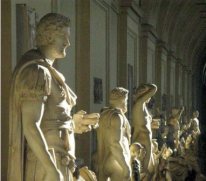 Rome, AD 77 AD, two years before the eruption of Vesuvius – best known for its eruption of AD 79 that led to the destruction of the Roman cities of Pompeii and Herculaneum.
Rome, AD 77 AD, two years before the eruption of Vesuvius – best known for its eruption of AD 79 that led to the destruction of the Roman cities of Pompeii and Herculaneum.
Some say Nemesis is the Avenging Angel; the retribution of the Gods for the sin of hubris, arrogance, under heaven. Others say Nemesis is the Arch-enemy, an antagonist who stands out from the rogues gallery. Thus, Falco and Petro are faced with an undiscovered nemesis, patron of rather odd cultic murders, until the pieces fall into place.
Falco’s son dies soon after childbirth; that day, another tragedy strikes the Didii, the demise of Favonius, Falco’s paterfamilias, that morning, apparently of heart attack. Ma Favonia kept on saying “I never like to gloat” at the funeral. Small wonder she had a veil on her face all day.
Petro and Falco discuss the events of the day, Albia is heartbroken over that fool Aulus coming home; Geminus has a statuary contract for the Colosseum Flavianus, still under construction. Statues are needed and must be paid for. Falco investigates his inherited stock of statues and missing creditors only to find that Petro is on the case as well. Ritual murder, or so it seems.
What a wonderful wife Helena Justina is; in grief, she understands that Falco must be Falco, a busy man, always getting his teeth in to challenges, work, mysteries and the block and tackle of his trade, and in addition, now, his Father’s trade; antique seller.
Central to this novel what you might call the detritus of the classes in ancient Roman society: Freedmen, slaves manumitted to free status. And some were slaves of Emperors, thus claiming the protection of the Emperor if they transfer their allegiance to the new Imperial Emperor.
Do Falco and Petro have a common arch-enemy, one whom we might label Nemesis? They do, (ipso facto, it seesm all of Rome has the same enemy); one who holds the office of Chief Spy, Anacrites.
It is odd, is it not, that Falco has saved Anacrites life three times, yet, Anacrites continues to plague Falco and Petro and their Families; perhaps we can put this down to rivalry – Anacrites has no family that he knows of, for he is an Imperial Slave, who has lived his entire life in service – one way or another – on the Palatine Hill, in the service of Claudius and subsequent Emperors.
The gang is all there – Falco’s family, his sisters, Ma Favonia, (whose brothers attend Geminius’s funerary rites), Petro’s family, Festus’s widow Marina and her daughter Marcia (looking for money), Albia in full teenage jilted sorrow, Laeta, and in the background, the influence of the Flavian Emperors is never far away.
Sub-rosa, Isca Rules?
A formal family conference is a symbol of emergency in Roman society. It happens rarely, because it only happens after outside measures have been tried and have failed. A fall back when public systems have collapsed, it is used for both utterly private reasons and for arranging a challenge to political tyranny … called by Helena Justina, no less!
Arch enemies meet, clash, and foil each other in the perennial tradition of Spy vs Spy. The boys from the Second Augusta are true to form, a perfect team.
Available on Amazon
Imago Roma

Roman Statuary …
![]()

